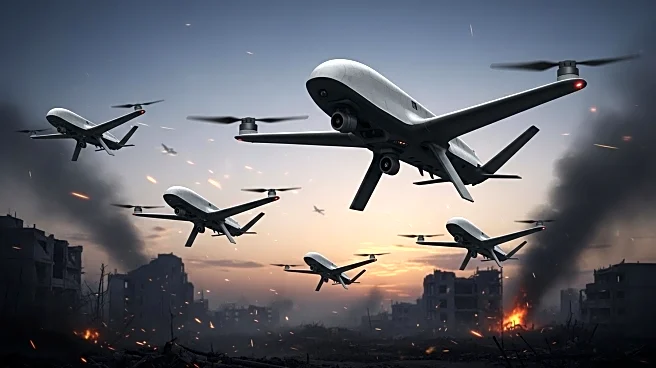What's Happening?
Russian forces are continuing their offensive operations in Ukraine, with a focus on drone strikes and small infantry assaults. The Russian military is reportedly conducting guided glide bomb strikes against Ukrainian positions, particularly targeting Kostyantynivka. Despite these efforts, Russian forces are facing challenges in advancing due to geographical obstacles such as the Siversky-Donets Donbas canal. Additionally, North Korea is planning to send approximately 6,000 troops to Russia to support reconstruction efforts, freeing up Russian personnel for combat roles. The economic impact of secondary sanctions and Ukrainian strikes on Russian oil refineries is causing gasoline shortages in occupied territories.
Why It's Important?
The intensification of Russian military operations in Ukraine, including the use of drones and guided bombs, highlights the ongoing conflict's impact on regional stability. The involvement of North Korean troops in non-combat roles could allow Russia to deploy more forces to the front lines, potentially altering the dynamics of the conflict. Economic sanctions and strikes on oil refineries are exacerbating resource shortages, which could further strain Russia's economy and its ability to sustain prolonged military operations. These developments have significant implications for international relations and the geopolitical landscape, particularly concerning U.S. and European interests in the region.
What's Next?
The ongoing conflict is likely to see continued military engagements, with Russian forces attempting to overcome logistical and geographical challenges. The deployment of North Korean troops may lead to increased Russian military presence in Ukraine, potentially escalating the conflict. Economic sanctions and resource shortages could prompt Russia to seek alternative solutions or concessions in international negotiations. The situation remains fluid, with potential diplomatic efforts from the U.S. and other stakeholders to address the conflict and its broader implications.
Beyond the Headlines
The use of drones and advanced military technology in the conflict raises ethical and legal questions about warfare and civilian safety. The involvement of North Korean troops, even in non-combat roles, underscores the complex international alliances and the potential for broader military cooperation. The economic impact of sanctions and resource shortages may lead to long-term shifts in Russia's economic strategies and its relations with global partners.










